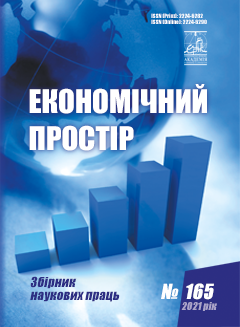IMPACT OF THE COVID-19 PANDEMIC ON THE GLOBAL ECONOMY
Abstract
The phenomenon of economic crisis, of course, is unpleasant and has a destructive effect on the economic and social life of society. The article describes the causes and consequences of the major crises of the world economy of the XIX–XXI centuries. Among the most common causes of economic downturns is the excess of investment or consumption in one or more sectors of the economy. At the same time, the consequences of these economic downturns were the advanced development of industry and a new round of machine invention in the XIX century, the failure of the gold and currency standard in the XX century and the reorientation of financial flows from speculative assets to others, including raw materials and energy in the nineteenth century. The new global crisis unfolds new challenges for the world community and the search for new ways out of it. The current pandemic has been marked by a particularly rapid and large-scale decline in demand and oil prices as a result of the sudden cessation of economic activity. Demand and prices for other goods show a smaller decline, as they are less affected by quarantine measures. However, as the pandemic continues and the economic downturn deepens, it is also possible to reduce demand and prices for metals. The impact of the 2020 economic downturn on the economy may persist for a long time. The deepening crisis may reduce the demand for industrial goods. The global financial crisis of 2020, caused by the outbreak of influenza COVID-19 may lead to long-term changes in global commodity markets. Increased transportation costs. Opportunities for the national producer. Growth of substitution among goods. Changing consumer behavior. After, a large number of workers can continue to work remotely, which can reduce transportation costs and demand for fuel. Businesses can cut back on travel abroad and use video conferencing and other remote alternatives. As a result, environmental pollution will be reduce. Further changes in society's behavior may lead to a shift in the structure of demand for goods. Increasing teleworking can reduce the demand for travel and oil. Reducing oil consumption will also provide environmental benefits.
References
2. Карвацка Н.С. Світові економічні кризи: причини виникнення, наслідки, інструментарій розв’язку. Вісник Хмельницького національного університету. 2011. № 2, T. 2. С. 53–61.
3. Коронавірус у цифрах: як змінилася світова економіка. URL: https://www.bbc.com/ukrainian/features-51994936 (дата звернення: 15.09.2020)
4. Основи економічної теорії : у 2 ч. : [навч. посібник / за ред. О.О. Мама-луя]. Харків : Національна юрид. академія України, 1999, 468 с.
5. Основи економічної теорії: політехнічний аспект: підручник / за ред. Г.Н. Климката, В.П. Нестеренка. Київ : Вид-во «Вища школа», 1997., 236 с.
6. Резнікова Н.В., Іващенко О.А. Нова норма світової економіки: зміст та ключові ознаки глобальних ризиків у контексті незалежності. Інвестиції: практика та досвід. 2017. № 9. С. 5–10.
7. Global Economic Prospects, The World Bank, 2020. URL: https://www.worldbank.org/uk/country/ukraine (дата звернення: 15.09.2020)
1. Danylenko Yu. (2020) Pryvody dlia optymizmu, mify ta ekonomichni naslidky. [Reasons for optimism, myths and economic consequences] Koronavirusnyi daidzhest [Coronavirus digest] (electronic journal) no. 3. Available at: https://voxukraine.org/uk/privodi-dlya-optimizmu-mifi-ta-ekonomichninaslidki-k ronavirusnij-dajdzhest-3/ (accessed 15 September 2020).
2. Karvatska N.S. (2011) Svitovi ekonomichni kryzy: prychyny vynyknennia, naslidky, instrumentarii rozviazku [World economic crises: causes, consequences, tools for solution]. Visnyk Khmelnytskoho natsionalnoho universytetu [Bulletin of the Khmelnytsky National University] no. 2, vol. 2, pp. 53–61.
3. Koronavirus v tsyfrakh: yak zminylasia svitova ekonomika. [Coronavirus in num-bers: how the world economy has changed] Available at: https://www.bbc.com/ukrainian/features-51994936 (accessed 15 September 2020).
4. Mamaluia O.O. (1999) Osnovy ekonomichnoi teorii [Fundamentals of economic theory]. Kharkiv: Natsionalna yuryd. akademiia Ukrainy (in Ukrainian)
5. Klymkata H.N., Nesterenka V.P. (1997) Osnovy ekonomichnoi teorii: politekhnichnyi aspekt [Fundamentals of economic theory: the polytechnic aspect: a textbook]. Kyiv: Vyshcha shk., p. 236. (in Ukrainian)
6. Reznikova N.V., Ivashchenko O.A. (2017) Nova norma svitovoi ekonomiky: zmist ta kliuchovi oznaky hlobalnykh ryzykiv u konteksti neozalezhnosti [New norm of world economy: content and key features of global risks in the context of independence] Investytsii: praktyka ta dosvid [Investment: practice and experience] no 9, pp. 5-10. (in Ukrainian)
7. Global Economic Prospects, The World Bank, (2020), Available at: https://www.worldbank.org/uk/country/ukraine (accessed 15 September 2020).



